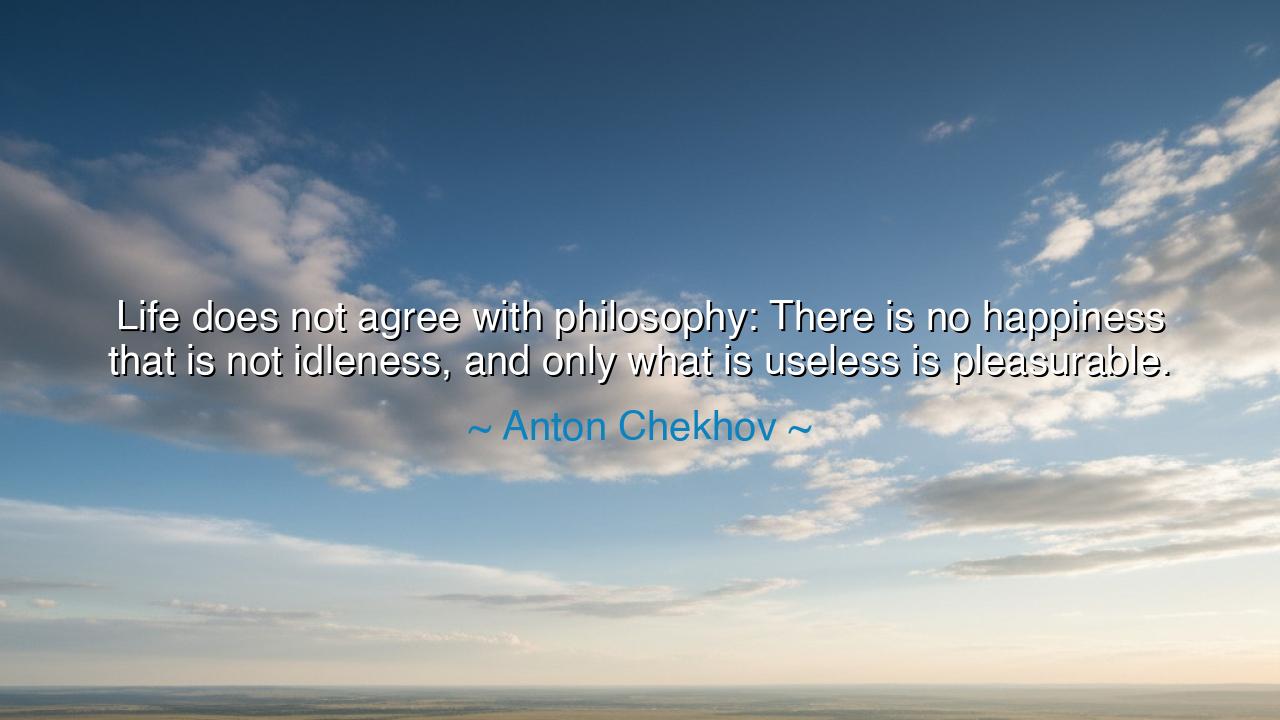
Life does not agree with philosophy: There is no happiness that
Life does not agree with philosophy: There is no happiness that is not idleness, and only what is useless is pleasurable.






When Anton Chekhov wrote, “Life does not agree with philosophy: There is no happiness that is not idleness, and only what is useless is pleasurable,” he spoke not as a dreamer, but as a physician of the soul. These words, rich with irony and melancholy, carry the quiet rebellion of a man who understood both the structure of the human mind and the weight of daily existence. Chekhov, who lived in the twilight between reason and longing, reveals in this quote the eternal tension between duty and joy, between what the world demands and what the heart desires. For in his view, the happiness we seek cannot be found in the restless striving of productivity, but in the sacred moments when we simply are.
Chekhov, one of Russia’s greatest writers, was a man of paradox. A doctor by profession and a playwright by genius, he healed both bodies and spirits. Yet he saw, in his own life and in the society around him, that men destroy themselves in pursuit of meaning, laboring endlessly for goals that do not satisfy. In this quote, he turns his gaze upon the hypocrisy of philosophy—its tendency to idealize toil, virtue, and rational purpose—while life itself whispers a different truth. The moments when we feel most alive, he suggests, are often the moments that appear most idle, most “useless”: a walk beneath the trees, a talk with a friend, the slow rhythm of a summer afternoon.
The origin of this reflection lies in Chekhov’s weary compassion for human nature. In his time, Russia was a nation obsessed with ideas—revolutionary philosophies, moral debates, political fervor. Chekhov watched men sacrifice peace for ideology, family for ambition, and joy for duty. And so he wrote with irony: “Life does not agree with philosophy.” The world of ideas is clean and ordered, but life—messy, sensual, fleeting—follows its own laws. Against the rigid structures of thought, he raises the tender rebellion of pleasure, of idleness, of beauty that serves no purpose except to delight.
Consider the life of Leo Tolstoy, Chekhov’s elder and fellow writer, who spent his later years in desperate search of moral purity. Tolstoy renounced wealth, family, and art in his pursuit of spiritual perfection. Yet the more he disciplined himself, the more sorrowful he became. Chekhov, observing from afar, recognized the tragedy: that happiness cannot be built upon denial. Man is not made for endless labor or moral self-torture; he is made for wonder, for rest, for useless joy. The philosopher who chases virtue may find wisdom, but the child who chases a butterfly has already found paradise.
Chekhov’s wisdom here is not cynicism—it is balance. He does not condemn work or thought, but he reminds us that without idleness, without leisure for the soul, work becomes a prison. He speaks for all those who have forgotten how to live while trying to “succeed.” He tells us that pleasure is not the enemy of virtue; it is the soil from which vitality grows. The artist who paints for beauty alone, the musician who plays for no audience, the dreamer who sits watching clouds—all are practicing the art of being human. These acts may be useless to the world’s logic, but they are essential to the heart.
The ancients knew this truth well. The Greek philosopher Epicurus taught that simple pleasures—friendship, quiet, and contemplation—are the foundation of a good life. The poet Horace praised the “golden mean,” the balance between effort and ease. And even Jesus, in the Gospel of Luke, told Martha that her sister Mary, who sat idly listening instead of working, had “chosen the better part.” Across the ages, the wise have known that in stillness and joy, man finds what no amount of toil can give. Yet we, the modern heirs of endless striving, have forgotten this sacred idleness.
So, my children of labor and longing, take Chekhov’s words to heart. Seek not always to justify your days by their usefulness. Rest without guilt. Dream without purpose. Laugh without reason. For these are the moments when life breathes through you, when the world ceases to demand and simply is. Let idleness become not laziness, but reverence for being. Let pleasure be not indulgence, but gratitude for the miracle of existence.
In the end, Chekhov reminds us that life does not obey our systems—it dances beyond them. The field does not ask the farmer why he rests to watch the sunset. The heart does not ask the mind for permission to feel joy. Therefore, honor the small, the slow, the “useless.” For in the quiet hours of idleness, when we release our need to achieve, we finally touch what is eternal: the simple, boundless happiness of being alive.






AAdministratorAdministrator
Welcome, honored guests. Please leave a comment, we will respond soon